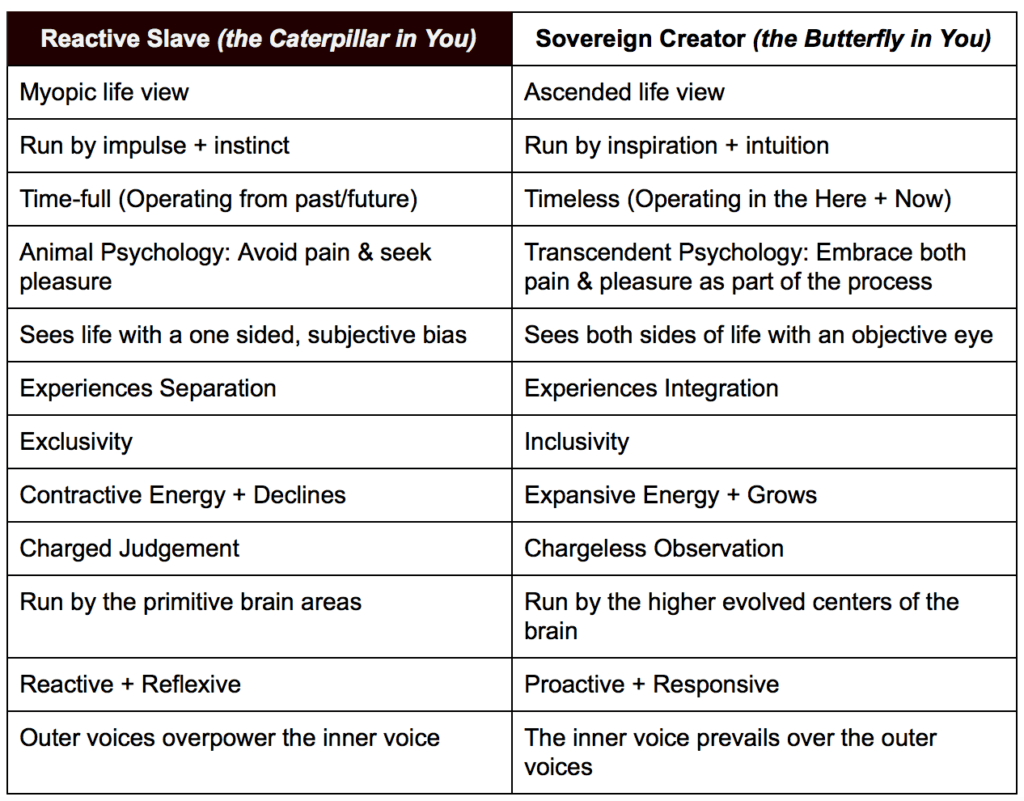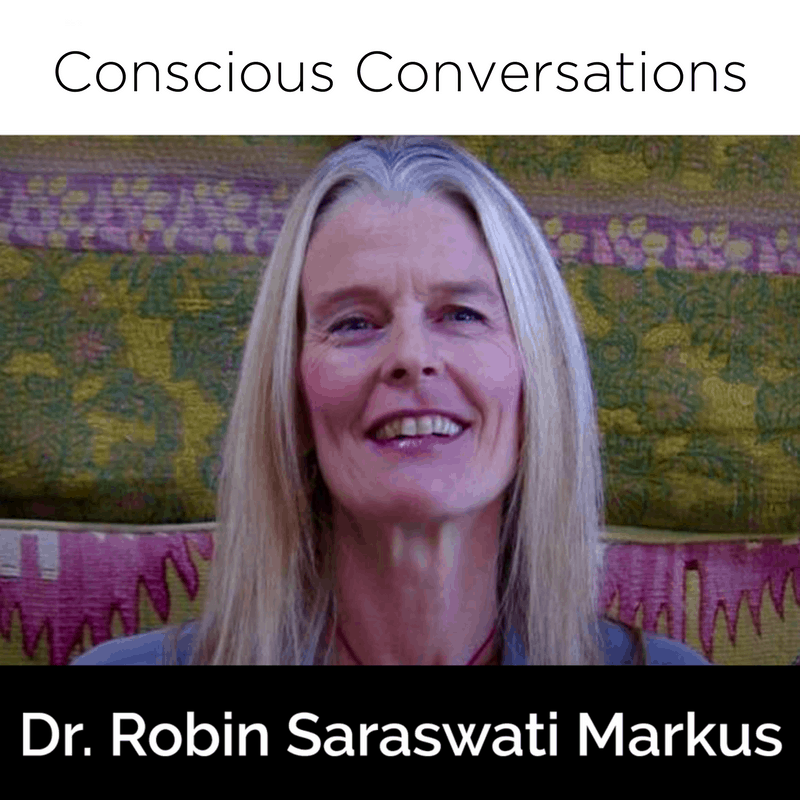A man may be born, but in order to be born he must first die, and in order to die he must first awaken.”
– Gurdjieff, Early 20th Century Russian mystic & philosopher
The Grand Metamorphosis is about death and destruction. And the re-emergence of a renewed, purified being.
Before becoming a butterfly, the caterpillar must first “melt off” its present skin almost completely. You see, when the caterpillar is summoned forth to begin this grand transformation process she envelops herself into the chrysalis or cocoon and squishes her pudgy little body in as tight as she can. Enzymes then start to dissolve the caterpillar’s body and turn it into a mushy, chunky soup contained within the cocoon.
Like the caterpillar, in order for real, true change to take place, we too must dissolve and “melt” away certain aspects of our old selves thereby creating a demarcation point, a threshold, a before-and-after spectrum.
There’s a great deal we can learn from nature’s elegant process of metamorphosis as it relates to our own transformation and self-realization. By studying and honoring the intelligent cycles and patterns of nature we can upgrade ourselves and our world. This is called biomimicry.
The Institute of Biomimicry defines it as:
“An approach to innovation that seeks sustainable solutions to human challenges by emulating nature’s time-tested patterns and strategies.” (1)
Essentially, what the study of biomimicry sets out to do is help us become ‘apprentices of nature’ as science writer and innovation consultant Janine Benyus calls it. Through biomimicry, we learn to maneuver through life emulating nature: achieving mental, emotional, and physical efficiency by creating the maximum output with the minimum, or most optimal use of resources.
So, what can we learn from the Butterfly and its morphing process so that we apply it to our own lives? How can we more efficiently deal with the changes that come our way?
It’s natural to fear change, and many of us fight it and resist it. This resisting leaves us feeling tired, and drained, frustrated, and defeated.
Instead of resisting the inevitable, though, witnessing the caterpillar’s transformational process in depth gently reminds us to embrace change and not only learn to gracefully flow with it, but also to utilize the momentum it can create to build upon it. As Brendon Burchard puts it:
THERE ARE ONLY 2 TYPES OF CHANGE:
1) Something new comes into your life.
2) Something new comes out of you.
This episode is about exploring the different facets of the morphing process so that you can rise above your current circumstances in order for something new to come out of you…
• Are You Viewing Life As a Caterpillar or a Butterfly?
While we’re in the throes of change, we’ll be experiencing reality from contrasting points of view, just like the Caterpillar and the Butterfly have very different perspectives on life:
On one hand, the caterpillar’s world view is of a myopic nature. It’s nearsighted and can only really see what’s in front of it. The caterpillar’s time horizons are therefore shorter. Looking up to things, since it crawls on the ground, it doesn’t really have a developed sense of depth perception. It sees the world from the bottom up, which is a very different perspective from that of the butterfly, who sees the world from an ascended, elevated vantage point. Because the butterfly can see from higher realms, it can see the Big Picture better, and therefore not only has better depth perception than the caterpillar, but also has a much more expanded time horizon.
• From Reactive Slave to Sovereign Creator:
The two metamorphic states of the Caterpillar and the Butterfly parallel the two main states in which we all operate in life: the Reactive Slave and the Sovereign Creator.
Although they’re the same being, the Caterpillar represents the Reactive Slave, and the Butterfly represents the Sovereign Creator. As an example, the Caterpillar has a myopic view of life looking up at the world while feeling small, just as the Reactive Slave does. The Butterfly, on the other hand, sees the world from above, looking down on it to see where it would love to go and what it would love to do guided by her inner senses, just as a Sovereign Creator lives.
When we’re in Reactive Slave mode we’re run by what’s going on in the external world; we’re products of our environment. This state is characterized by the typical “survival” mode of “fight, freeze, or flight.”
When we’re in Sovereign Creator mode we’re connected to our inner environment more than our outer circumstances. This state is characterized by a balanced and strong sense of self and a groundedness that’s palpable and heartfelt.
More distinctions between these two states:

While oscillating between the two states is not only normalbut inevitable, sometimes we tend to stay in Reactive Slave mode for a prolonged period of time. The longer we stay in this mode, the more accustomed and comfortable we get to its frequency. It becomes a type of home base and we can even attach our identity and story around it.
This also works inversely, so the more we cultivate the Sovereign Creator abilities and traits listed just now, the more natural and habitual it will be to operate more and more from this mode and even link our identity and story to it instead.
• Setting Yourself Up To Win: 4 Things That Keep You Stuck In Reactive Slave Mode:
Change can happen on three levels:
1) Perceptual
2) Behavioral
3) Structural…
1) Perceptual – how you see your world, and the stories you make up about your world. Often it is just a slight change of perception that can create immense liberation.
2) Behavioral – your actions, choices, and how you show up in your world, who you are being. We’re creatures of habit and memorized behaviors and emotions. When we can cast awareness on our subconscious, automatic behaviors and patterns, we can create a huge ripple effect.
3) Structural – any system or structure involving your life and its different components, including the structure of your body.
Small changes in any of these levels, performed consistently, over a period of time create BIG shifts and profound differences. This, in essence, is what the Butterfly Effect theory is all about.
If we’ve become accustomed to chronically operating in Reactive Slave mode, Sovereign Creator mode will feel very foreign at first. Everything from our thought and emotional patterns to our own cellular biology will be running the old, deeply entrenched reactive loops. That’s why the most efficient and effective way to reprogram ourselves is by implementing small changes gradually, so that we can give our minds and bodies time to process and rewire accordingly without going into overwhelm or overdrive mode.
This is where it’s so important we befriend ourselves and stand in our own corner. And this is why learning to be your own support system is crucial during this time and it’s how you’ll set yourself up to win.
Any kind of transformation is going to challenge you and bring up your repressed crap.
Experiences create emotional reactions. If the emotional reaction lasts hours or days, we’d call it a mood. If it lasts weeks or months, the mood turns into a disposition or what we call someone’s ‘nature.’ If the emotional reaction lasts years we’d then call it a personality trait. The longer we stay in an emotional reaction space, the more we memorize this way of being.
Dr. Joe Dispenza discusses this concept in his book Breaking the Habit of Being Yourself: How to Lose Your Mind and Create a New One:
He says: “A mood is a chemical state of being, generally short-term, that is an expression of a prolonged emotional reaction. The chemicals of that emotion don’t get used up instantly, so their effect lingers for a while. I call that the refractory period—the time after their initial release and until the effect diminishes. The longer the refractory period, obviously, the longer you experience those feelings. When the chemical refractory period of an emotional reaction lasts for hours to days, that’s a mood…
A temperament is an emotional reaction with a refractory period that lasts from weeks to months. Eventually, if you keep the refractory period of an emotion going for months and years, that tendency turns into a personality trait. At that point others will describe you as “bitter” or “resentful” or “angry” or “judgmental.” Our personality traits, then, are frequently based in our past emotions. Most of the time, personality (how we think, act, and feel) is anchored in the past.” (2)
It is true that so much that happens to us is out of our control. It’s also true that there are many things we can indeed control. The Sovereign Creator chooses to stop wasting time, energy, and other resources on what they can’t control. Instead, she focuses her attention and intention on what she can control and how she can set herself up to win.
One of the most controllable areas we can focus on is our body. Much of what we input and ingest into our systems impacts our emotional reactions, and our ability to think and rationalize. It can make the difference between being reactive or building up that sovereignty within.
Here are 4 things you can start to do right now to help you make the leap from Reactive Slave to Sovereign Creator (and stay there for longer):
1. Eat the right foods, at the right times.
The foods we eat and the times we eat them have a huge impact on our mental and emotional state and moods! Constantly feeding yourself energy zapping, low vitality foods is not setting yourself up to win, it’s actually you tripping yourself up.
Low vitality foods can wreak havoc with our blood sugar/glucose levels, which has been well documented to impact our level of clarity and reasoning, and our level of irritability and anxiety among other markers. (3) When our glucose levels are out of whack, we’re operating from the lower centers of the brain and we’re much more prone to be more reactive and reflexive as opposed to more responsive and proactive.
2. Watch your alcohol intake and timing.
It’s no secret alcohol directly impacts us on various levels. Mentally, it affects major parts of the brain centers that regulate emotion, coordination, and cognition. Excessive alcohol consumption, even if it’s just a one-off time, impacts our brain neurons.
One publication by the National Institutes of Health reports:
“Heavy alcohol consumption—even on a single occasion—can throw the delicate balance of neurotransmitters off course. Alcohol can cause your neurotransmitters to relay information too slowly, so you feel extremely drowsy. Alcohol-related disruptions to the neurotransmitter balance also can trigger mood and behavioral changes, including depression, agitation, memory loss, and even seizures.” (4)
I myself love my martini nights, but the truth is that if I go overboard, I pay for it the next day, even if I don’t necessarily have a “hangover” per se. My brain’s foggy, and I feel much more sensitive and blue and moody. And I’m definitely much more prone to attack the burger and fries!
3. Honor your sleep cycle and sleep quality.
The Sovereign Creator knows the impact of not gifting herself regular high-quality sleep. She knows that insufficient sleep impacts her cognitive function and her ability to think clearly and operate from the higher evolved centers of the brain. (5)
According to Harvard Healthy Sleep Research, low quality or insufficient sleep has been linked to chronic diseases, weight gain/obesity, mood disorders, and a weakened immune function. (6)
Dr. Steven Feinsilver, director of the Center for Sleep Medicine at Mount Sinai New York City warns: “If a person is deprived of sleep, it can lead to tremendous emotional problems.” (7)
Gift yourself, your mind, and your body quality sleep so you can maintain sovereign functioning levels.
4. Hydrate, hydrate, hydrate.
Drinking enough clean alkaline water isn’t just good for your kidneys and your skin. Two studies from the University of Connecticut’s Human Performance Laboratory found that:
“Even mild dehydration can alter a person’s mood, energy level, and ability to think clearly… The tests showed that it didn’t matter if a person had just walked for 40 minutes on a treadmill or was sitting at rest – the adverse effects from mild dehydration were the same.” (8)
A study published in the publication Appetite found that there was a direct correlation between the amount of water women consume and their mood levels. The greater the water intake, the better the mood. (9)
So as you’re dealing with change, constantly ask yourself, are you being the Caterpillar – the Reactive Slave, or the Butterfly – the Sovereign Creator? Use this metaphor to guide you. Use the Butterfly Effect in your favor, remembering that small, regular changes every day create a compounded and profound shift in your life.
As we’ve discussed, change is inevitable and constant. You can only control you, your perceptions, your behaviors and this is your choice every day. The 4 simple small tips are things that you can control right now. Simple things to choose yourself, to love yourself and to be your own best friend. Regular and nourishing food, hydration, less alcohol, more sleep. Each day you give yourself these gifts you’ll expand the time that you live in Sovereign Creator mode. What you’ll soon find is that before you know it, you’ll be living a deliberate, inspiring life that you have created.
And when the challenges and fears rise up, because they will, bless them. They’re a sign and symbol of your growth and expansion.
Understanding and practicing the yogic principle of Tapas can be a very powerful tool when fear surfaces. Tapas means ‘fiery discipline’ and accepting pain as help for purification, for shedding those old, stale layers that no longer serve us as we become sovereign.
By practicing Tapas, we courageously feel the burn and allow it to transform us from the inside out. The Butterfly and the Sovereign Creator deliberately face the fire, in spite of their fears, because they know that it is only through this purifying heat that their impurities will be cleansed out and a new skin will emerge from the ashes.
In Lakech,
![]()
REFERENCES:
- https://biomimicry.org/what-is-biomimicry/#.V5x0gpN95sM
- Dispenza, Joe (2012-02-15). Breaking the Habit of Being Yourself: How to Lose Your Mind and Create a New One (p. 90). Hay House. Kindle Edition.
- http://www.mayoclinic.org/diseases-conditions/hypoglycemia/basics/symptoms/con-20021103
- http://pubs.niaaa.nih.gov/publications/Hangovers/beyondHangovers.html
- http://www.ncbi.nlm.nih.gov/pmc/articles/PMC2656292/
- http://healthysleep.med.harvard.edu/healthy/matters/consequences/sleep-and-disease-risk
- http://www.livescience.com/52592-spooky-effects-sleep-deprivation.html
- http://today.uconn.edu/2012/02/even-mild-dehydration-can-alter-mood/
- http://www.ncbi.nlm.nih.gov/pubmed/25963107












